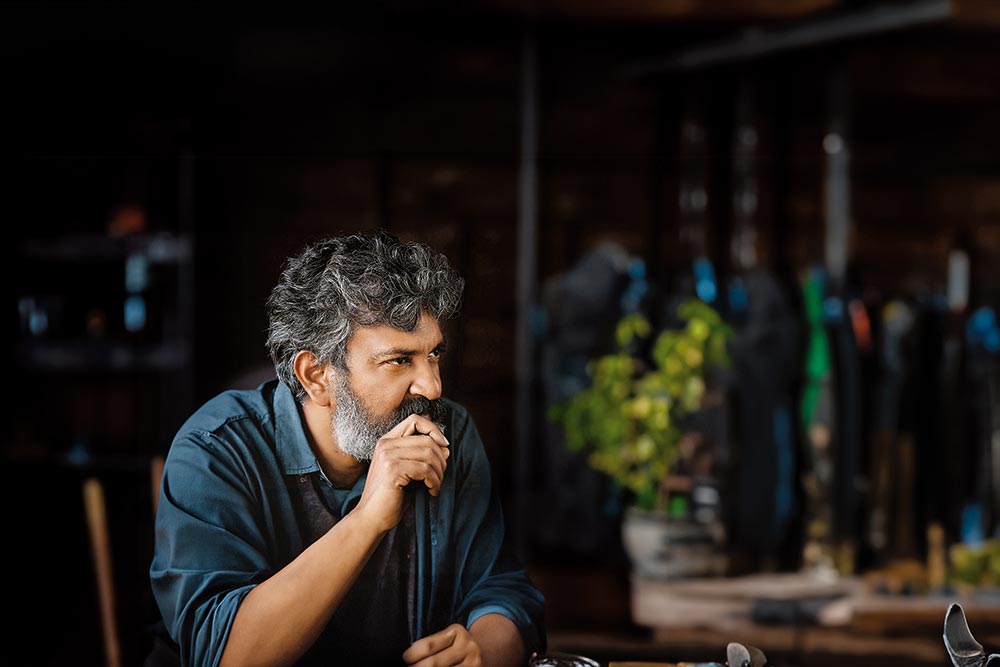To simply recognise Koduri Srisaila Sri Rajamouli as India’s greatest filmmaker of today is like stating the obvious. The mere mention of his name conjures up images of larger-than-life films made on a scale never seen before on Indian screens. Rajamouli’s signature style of storytelling, underpinned by stunning visuals, incredible grandeur of sets, breathtaking action sequences and Hollywood-like computer-generated imagery have helped whet the appetite of Indian audiences for such films.
The 50-year-old auteur infused new life into cinemas across the country and beyond with his big films like Baahubali (2015), Baahubali 2 (2017) and RRR (2022). No wonder filmmaker Mahesh Bhatt calls him a “game changer” whose movies “redefined everything that was thought and known about Indian films”. “A lot of people believe in becoming smaller. I believe in becoming bigger as a filmmaker,” Rajamouli once told Outlook in an interview.
Shah Rukh Khan’s Jawan, released this year, set the cash registers ringing. But long before that, Rajamouli’s Baahubali 2 ran like a raging bull at the global box office, prompting trade pundits to hail it as the Baahubuster of all time. The film grossed $10.1 million overseas in its first weekend—the best for an Indian film.
After Baahubali: The Beginning and Baahubali: The Conclusion, doubters thought he would succumb to the Ramesh Sippy syndrome and, like the director who could never repeat the magic of the 1975 release Sholay, Rajamouli would not be able to better his work in the magnum opus. But he pulled RRR out of his magical hat to create a worldwide sensation, winning the best original song award for its Naatu Naatu at the Oscars earlier this year.
He is, of course, not one to rest on his laurels or become complacent. “There is no way I can get complacent,” he says. After he made Magadheera (2009), someone told him that he had reached his peak. It took him by surprise because he felt he had just started then. He went on to do Maryada Ramanna (2010) and Makkhi (2012) before the two Baahubalis and RRR.
Leader Across Borders
Despite working primarily in the Telugu film industry and never forgetting to emphasise that his films are “not Bollywood”, he has gone on to become the highest-grossing Indian director of all time. His films have been touted as India’s answer to Game of Thrones and Star Wars and have even been compared to the legendary Hollywood films Ben-Hur and The Ten Commandments for their visuals.
Rajamouli believes that the more a film appeals to audiences on an emotional level, the more they flock to the cinemas. On his obsession with larger-than-life films, he says that he can only tell stories that he feels for, regardless of market conditions. “I just write the story that drives me to make the film. Once my story is ready, the kind of film I want to make and its budget, etc. comes into play,” he says.
However, he points out that larger-than-life films attract audiences if they are made in the best possible way. “If you just shell out money to create elaborate songs or sets, you cannot expect the audience to love your film. Even a nice comedy with a small budget will bring audiences to the cinemas, not just the big films,” he says.
Since the release of Baahubali, Rajamouli has shattered many myths about Indian cinema both on and off screen. Among other things, he has dispelled the notion that the showmen of Indian cinema come only from Malabar Hill or Pali Hill, the Mumbai pocket boroughs of the barons of Bollywood. They may also come from Jubilee Hills in faraway Hyderabad.
Rajamouli is least aware of his standing in the Indian film industry and ignores all the hype surrounding him. He simply concentrates on delivering blockbusters that bear the unmistakable stamp of his brilliance all over. He just lets his work act as a baahubali
for him.











